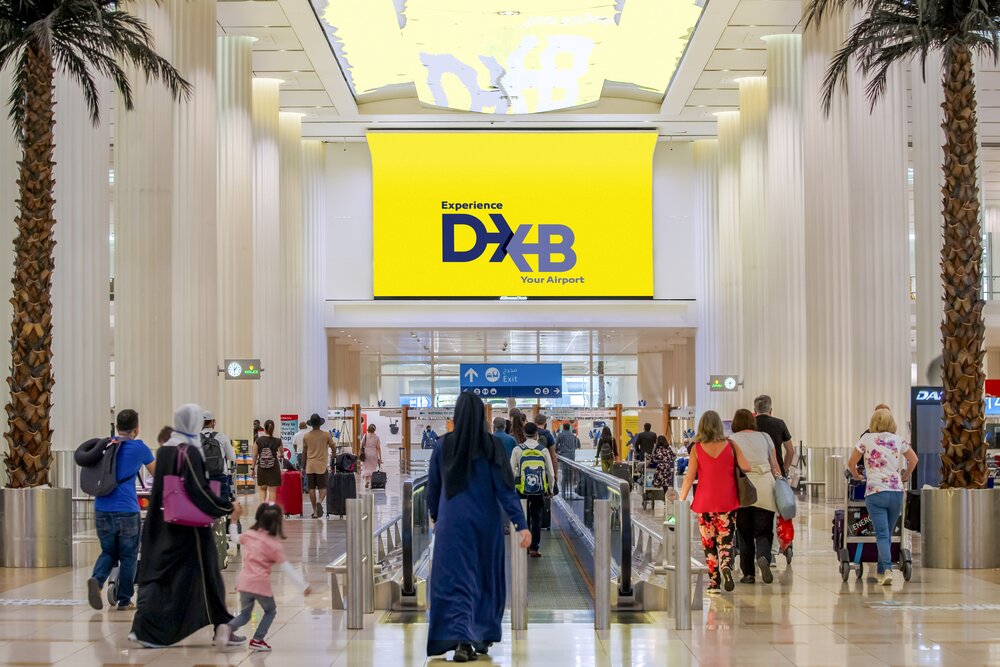Amid airspace closures, 700 flights with airlines including Emirates, Etihad and Air Arabia cancelled
Travellers flying out of the UAE face disruption following the suspension of flights to some destinations as tension escalates between Israel and Iran.
More than 700 flights have already been cancelled across the region, as of 16 June, including from Dubai International Airport (DXB), Dubai World Central – Al Maktoum International Airport, Zayed International Airport in Abu Dhabi and Sharjah International Airport.
UAE-based airlines Emirates, Etihad, Flydubai, Wizz Air and Air Arabia have halted flights to Israel, Iran, Iraq, Lebanon and Jordan with some of those suspensions extended until 30 June 2025.
Outside of the countries directly impacted by the airspace closures, other routes to destinations including Armenia, Azebaijan, Georgia and Uzbekistan have also been impacted with flights either cancelled or delayed due to rerouting.
The latest data from FlightAware.com for 16 June shows 38 flights (6%) from DXB were cancelled and 213 flights (34%) delayed, while Zayed International Airport in Abu Dhabi had three cancellations (1%) and 61 delays (24%).
 213 flights delayed at DXB as of 16 June
213 flights delayed at DXB as of 16 June
Low-cost airline Flydubai saw 49 cancellations (13%) and 139 delays (38%). Air Arabia had 29 cancellations (12%) and 46 delays (19%). Emirates saw six cancellations (1%) and 203 delays (39%).
Some UAE residents reported significant delays at DXB, with one passenger attempting to reach Beirut for a family wedding delayed by 24 hours but managing to find an alternative flight, according to Khaleej Times. That passenger praised DXB staff for their handling of the situation.
Passengers travelling to and from the UAE are encouraged to check their flight status before arriving at the airport and to expect delays.
RELATED:
Abu Dhabi's Etihad labelled "fastest growing" Middle East airline
Saudia airline launches Riyadh-Vienna service
UAE’s Air Arabia to double Sharjah-Maldives service
Route cancellations from UAE airlines
Emirates says all its flights to Tehran in Iran, and Baghdad and Basra in Iraq have been suspended until 30 June, and to Amman in Jordan and Beirut in Lebanon until 22 June. Emirates passengers with connecting flights through Dubai with final destinations in Iraq, Iran, Jordan, Lebanon or with further Flydubai connections to suspended destinations, will not be accepted for travel at their point of origin.
Flydubai has suspended flights to Iran, Iraq, Israel and Syria until 20 June, with flights to Jordan and Lebanon set to resume as daytime operations from 17 June.
As of 16 June, Air Arabia, which operates flights out of Sharjah as well as Abu Dhabi, said all its flights to Iran, Iraq, Lebanon, Jordan and Russia have been temporarily suspended. Iran and Iraq flights are affected until 30 June, Jordan and Russia until 20 June, and Lebanon until 17 June. Flights to Armenia, Georgia, Azerbaijan, Kazakhstan and Uzbekistan have also been impacted.
Etihad Airways cancelled its services to and from Tel Aviv until June 22 and is rerouting some services.
Wizz Air has suspended operations to Tel Aviv and Amman until 20 June, and also suspended flights from Abu Dhabi to Uzbekistan, Kazakhstan and Kyrgyzstan.
Airlines in the UAE first announced the temporary suspension of flights on Friday 13 June when Israel began its attacks on Iran but have since extended these as tensions continue to escalate.
Airports across the region are also having to contend with diverted flights, especially long-haul incoming flights to India. Sharjah and Jeddah are among the destinations that have been accommodating flights from the US bound for Delhi and Mumbai.
For more information, visit dubaiairports.ae

_w=940_h=488_pjpg.jpg?v=e5490446)



_w=640_h=335_pjpg.jpg?v=e5490446)
_w=640_h=335_pjpg.jpg?v=e5490446)
_w=640_h=335_pjpg.jpg?v=e5490446)
_w=640_h=335_pjpg.jpg?v=e5490446)